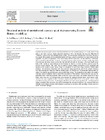Structural analysis of unreinforced masonry spiral staircases using Discrete Element modelling
dc.contributor.author
Dell'Endice, Alessandro
dc.contributor.author
DeJong, Matthew J.
dc.contributor.author
Van Mele, Tom
dc.contributor.author
Block, Philippe
dc.date.accessioned
2022-11-01T14:59:30Z
dc.date.available
2022-11-01T04:24:38Z
dc.date.available
2022-11-01T14:59:30Z
dc.date.issued
2022-12
dc.identifier.issn
2352-0124
dc.identifier.other
10.1016/j.istruc.2022.10.070
en_US
dc.identifier.uri
http://hdl.handle.net/20.500.11850/578771
dc.identifier.doi
10.3929/ethz-b-000578771
dc.description.abstract
Unreinforced masonry spiral staircases have been built for more than two thousand years in castles, churches and palaces, and these staircases require structural assessment. For a few decades, the structural behaviour of “cantilever” staircases has been debated among scholars. Several structural methods have been used, but due to the complex 3D geometry and the substantial number of treads, a priori assumptions have been made about the magnitude and point of application of the contact forces between the treads and the wall-tread connections. These assumptions influence the calculation of torsional moment, which, in some methods, reaches high values that could generate shear stresses greater than the material's strength. In this paper, a 3D model based on one helix of the “cantilever” spiral staircase of San Domingo de Bonaval, in Spain, has been analysed using the Discrete Element Method. The entire stair is analysed without making assumptions on the magnitude and location of the resultant contact forces, which are calculated for each tread using customised Python-based functions. The wall-tread connections have been modelled using rigid blocks, and several contact conditions have been investigated. Moreover, different friction angles and the influence of geometrical imperfections are analysed to simulate material tolerances and assembly imprecisions. The simulation results indicate that perfect wall-tread contact conditions lead to conservative predictions of the torsional moment. Instead, gaps and imperfections allow small displacements, which reduce the torque and increase compression forces in the inner helical ring of the stair. Low friction angles could increase the torsional moment values, while vertical settlements do not cause a significant effect. Cantilever situations could still occur due to not perfect contact conditions between consecutive treads, which suggests that the tread-tread contact area should be carefully inspected during restoration. More generally, this paper demonstrates the potential variability of the structural behaviour of highly indeterminate structures when boundary conditions are uncertain, while providing valuable context to inform restoration strategies.
en_US
dc.format
application/pdf
en_US
dc.language.iso
en
en_US
dc.publisher
Elsevier
en_US
dc.rights.uri
http://creativecommons.org/licenses/by-nc-nd/4.0/
dc.subject
Cantilever spiral staircase
en_US
dc.subject
Unreinforced masonry
en_US
dc.subject
Discrete element modelling
en_US
dc.subject
Geometrical imperfections
en_US
dc.subject
Rigid blocks
en_US
dc.title
Structural analysis of unreinforced masonry spiral staircases using Discrete Element modelling
en_US
dc.type
Journal Article
dc.rights.license
Creative Commons Attribution-NonCommercial-NoDerivatives 4.0 International
dc.date.published
2022-10-25
ethz.journal.title
Structures
ethz.journal.volume
46
en_US
ethz.pages.start
214
en_US
ethz.pages.end
232
en_US
ethz.size
19 p.
en_US
ethz.version.deposit
publishedVersion
en_US
ethz.grant
Practical Stability Assessment Strategies for Vaulted Unreinforced Masonry Structures
en_US
ethz.identifier.wos
ethz.identifier.scopus
ethz.publication.place
Amsterdam
en_US
ethz.publication.status
published
en_US
ethz.leitzahl
ETH Zürich::00002 - ETH Zürich::00012 - Lehre und Forschung::00007 - Departemente::02100 - Dep. Architektur / Dep. of Architecture::02602 - Inst. f. Technologie in der Architektur / Institute for Technology in Architecture::03847 - Block, Philippe / Block, Philippe
ethz.leitzahl.certified
ETH Zürich::00002 - ETH Zürich::00012 - Lehre und Forschung::00007 - Departemente::02100 - Dep. Architektur / Dep. of Architecture::02602 - Inst. f. Technologie in der Architektur / Institute for Technology in Architecture::03847 - Block, Philippe / Block, Philippe
ethz.grant.agreementno
178953
ethz.grant.fundername
SNF
ethz.grant.funderDoi
10.13039/501100001711
ethz.grant.program
Projekte MINT
ethz.date.deposited
2022-11-01T04:24:38Z
ethz.source
SCOPUS
ethz.eth
yes
en_US
ethz.availability
Open access
en_US
ethz.rosetta.installDate
2022-11-01T14:59:32Z
ethz.rosetta.lastUpdated
2023-02-07T07:26:31Z
ethz.rosetta.versionExported
true
ethz.COinS
ctx_ver=Z39.88-2004&rft_val_fmt=info:ofi/fmt:kev:mtx:journal&rft.atitle=Structural%20analysis%20of%20unreinforced%20masonry%20spiral%20staircases%20using%20Discrete%20Element%20modelling&rft.jtitle=Structures&rft.date=2022-12&rft.volume=46&rft.spage=214&rft.epage=232&rft.issn=2352-0124&rft.au=Dell'Endice,%20Alessandro&DeJong,%20Matthew%20J.&Van%20Mele,%20Tom&Block,%20Philippe&rft.genre=article&rft_id=info:doi/10.1016/j.istruc.2022.10.070&
Files in this item
Publication type
-
Journal Article [128972]

